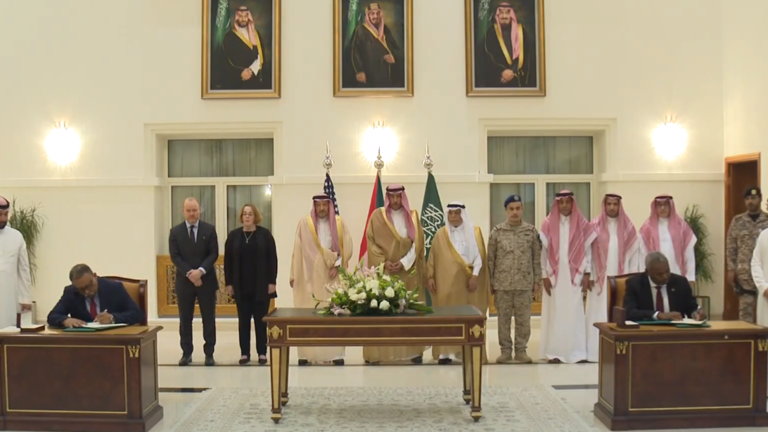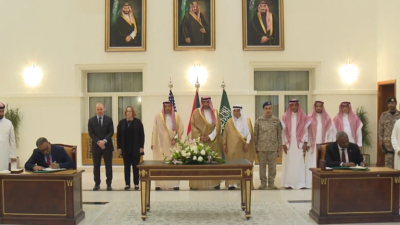Representatives of the Sudanese Armed Forces led by Abdel Fattah al-Burhan and the Rapid Support Forces led by Mohamed Hamdan Dagalo have signed a new agreement to facilitate humanitarian assistance in Sudan, initiated by the Kingdom of Saudi Arabia and the United States, known as the "Jeddah Agreement."
The text of the "Jeddah Agreement," signed yesterday, Thursday, states: "We, the undersigned, the Sudanese Armed Forces and the Rapid Support Forces, affirm through this agreement our basic commitments under international humanitarian law to facilitate humanitarian work to meet civilian needs. We reaffirm our steadfast commitment to the sovereignty of Sudan and the preservation of its unity and territorial integrity. We recognize that adherence to this agreement will not affect any legal, security, or political status of the parties signing it, nor will it be linked to engagement in any political process. We welcome the efforts made by the friends of Sudan who utilize their relationships and good offices to ensure respect for international humanitarian law and international human rights law, including adherence to and immediate implementation of this agreement. None of the points mentioned below shall replace any obligations or principles under international humanitarian law and international human rights law that apply to this armed conflict, particularly the Additional Protocol II of 1977, annexed to the four Geneva Conventions of 1949, which all parties must adhere to.
**Obligations:**
1. We agree that the interests and safety of the Sudanese people are our primary priorities, and we reaffirm our commitment to ensuring the protection of civilians at all times, including allowing safe passage for civilians to leave areas of active hostilities on a voluntary basis in the direction of their choosing.
2. We affirm our responsibility to respect international humanitarian law and international human rights law, including the commitment to:
- Distinguish at all times between civilians and combatants and between civilian objects and military objectives.
- Refrain from any attack that is expected to cause incidental civilian damage that is excessive in relation to the anticipated concrete and direct military advantage.
- Take all necessary precautions to avoid and minimize harm to civilians, aiming to evacuate protective centers including civilian residences; for example, civilians should not be used as human shields.
- Ensure that checkpoints are not used in violation of the principle of the free movement of civilians and humanitarian actors.
- Allow all civilians to voluntarily and safely leave areas of hostilities and any besieged areas.
- Commit to protecting the essential needs that are indispensable for the survival of civilian populations, which may include food, agricultural areas, crops, and livestock. Looting, pillaging, and destruction are also prohibited.
- Commit to evacuation and refrain from seizure, and respect and protect all private and public facilities such as medical facilities, hospitals, and water and electricity installations, and refrain from using them for military purposes.
- Commit to respecting and protecting medical transport means such as ambulances and refrain from using them for military purposes.
- Commit to respecting and protecting medical workers and public facilities.
- Respect and not infringe upon civilians' right to movement and travel along roads and bridges inside and outside Khartoum state.
- Take all possible measures to collect and evacuate the injured and sick, including combatants - without discrimination - and allow humanitarian organizations to do so, without hampering medical evacuation operations, including during active hostilities.
- Refrain from recruiting children and using them in hostilities.
- Refrain from engaging in forced disappearances and arbitrary detention of civilians.
- Refrain from any form of torture or other cruel, inhuman, or degrading treatment, including all forms of sexual violence.
- Treat all persons deprived of their liberty humanely and enable humanitarian organizations to have regular access to detained individuals.
3. We recognize that humanitarian activities aim to alleviate human suffering and protect the lives and dignity of non-combatants or those who have ceased to fight. We agree on the necessity of allowing the resumption of essential humanitarian operations and protecting humanitarian workers and assets, which includes:
- Respecting the fundamental humanitarian principles of humanity, impartiality, neutrality, and independence of humanitarian operations.
- Allowing rapid and unhindered passage of humanitarian assistance, including medical and surgical supplies, and ensuring the freedom of movement for relief workers necessary for fulfilling their duties. This includes:
(1) Facilitating safe and rapid unhindered passage for humanitarian workers through all available routes (and any established humanitarian corridors) as required, into and within the country, including the movement of humanitarian aid convoys.
(2) Adopting simple and speedy procedures for all logistical and administrative arrangements for humanitarian relief operations.
(3) Committing to regular humanitarian pauses and days of calm as needed.
(4) Refraining from intervening in key humanitarian operations and not accompanying humanitarian workers when they are conducting humanitarian activities, while considering adjusted guidelines and procedures for humanitarian work in Sudan. Protecting and respecting humanitarian workers and assets including supplies, offices, warehouses, and other facilities in the humanitarian field. Armed groups must not interfere in humanitarian operations. While respecting the neutrality principle of humanitarian actors, armed groups must ensure the security of transport routes and storage and distribution areas. Attacks against individuals, harassment, intimidation, arbitrary detention, or assault on supplies, facilities, materials, units, or vehicles for relief are also banned.
4. Make every effort to ensure that these commitments - and all obligations under international humanitarian law - are fully disseminated within our ranks, and designate points of contact to engage with humanitarian actors to facilitate their activities.
5. Empower responsible humanitarian entities, such as the Sudanese Red Crescent and/or the International Committee of the Red Cross, to collect the deceased, register their names, and bury them in coordination with the relevant authorities.
6. Take all necessary measures to ensure that all persons subject to our orders, directives, or control comply with international humanitarian law, particularly the commitments outlined in this agreement.
7. In enhancing the principles and commitments in this agreement, we commit to prioritizing discussions aimed at achieving a short-term ceasefire to facilitate the delivery of urgent humanitarian assistance and restore essential services. We also commit to scheduling subsequent expanded discussions to achieve a permanent cessation of hostilities.
**Saudi Foreign Minister: Jeddah Talks for Restoring Stability to Sudan**
Saudi Foreign Minister Faisal bin Farhan tweeted, saying: "The city of Jeddah has gathered representatives of the Sudanese Armed Forces and the Rapid Support Forces in an initiative to resolve the crisis. The discussions that took place and the commitment to protect civilians comes as a first step, followed by other steps, and the most important thing is adhering to what has been agreed upon, and the Kingdom will work until security and stability return to Sudan and its brotherly people."
**United Nations: Agreement is an Important First Step**
UN Special Representative to Sudan Volker Perthes confirmed that "the agreement on protecting civilians is an important first step," stating that "one of the parties in Sudan informed me that they intend to stay and continue ceasefire discussions." He mentioned that "he does not intend to leave Sudan amidst protests against his presence," and predicted that "ceasefire discussions in Sudan would resume today or tomorrow." He noted that "the lack of adherence to ceasefire operations in Sudan so far is due to each party believing it can achieve victory."




